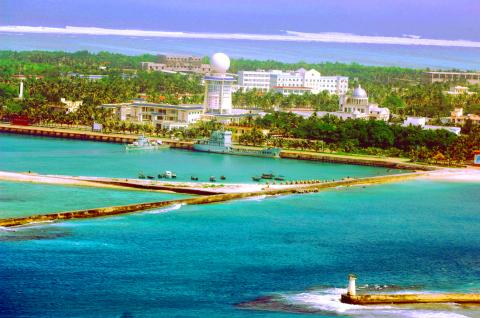In a move that risks increasing regional tensions, China yesterday announced it will invest more than 10 billion yuan (US$1.6 billion) to build infrastructure on disputed islands in the South China Sea and to strengthen marine law enforcement in the region.
Citing Hainan Province Governor Jiang Dingzhi (蔣定之), the Guangzhou-based 21st Century Herald reported that China would build an airport, piers and other important infrastructure on islands administered by Sansha (三沙), a prefecture-level city under Hainan’s jurisdiction that was created in July following approval by the State Council in June.
Located on Woody Island (Yongxing Island, 永興島), the largest island in the Paracels (Xisha Islands, 西沙群島) and 350km southeast of Hainan, Sansha “administers” more than 200 islets, sandbanks and reefs and their surrounding waters in the Spratly Islands (Nansha Islands, 南沙群島), Macclesfield Bank (Zhongsha Islands, 中沙群島) and the Paracel chains.

Photo: AFP
Some of the construction has already begun, the paper said, without providing details.
The Industrial and Commercial Administration Bureau of Hainan Province announced in September that the establishment of Sansha had caught the attention of investors, with the bureau receiving “multiple queries” about setting up businesses in Sansha.
A construction company and a tourism investment company received approval in August and September respectively, Chinese media said.
According to a report in Caijing magazine, officials in Sansha have been evaluating various commercial development plans, including the establishment of a tax haven and casino resorts.
While serving to create facts on the ground to bolster China’s sovereignty claims in the South China Sea, the investment projects have been a source of tension with other claimants, forcing Beijing to add a security component to the project.
In July, China’s Central Military Commission approved the creation of a military garrison on Sansha.
Taiwan, Vietnam, the Philippines, Malaysia and Brunei also have claims to some of the islets. Itu Aba Island (Taiping Island, 太平島), the largest islet in the Spratlys, is controlled by Taiwan.
According to the Herald, Jiang added that in addition to supporting infrastructure, the funds would be used to acquire marine law enforcement vessels and supply ships.
Under new rules announced last month and which are to come into effect on Tuesday next week, police in Hainan will have the authority to board and seize control of foreign ships that “illegally” enter Chinese waters. It remains unclear whether the directive only pertains to coastal areas near Hainan Island or to the entire body of water administered by Sansha.
Chinese media reported at the time that the government would also send new maritime surveillance ships to supplement the fleet responsible for patrolling the South China Sea.
Additional reporting by Bloomberg

Tropical Storm Gaemi strengthened into a typhoon at 2pm yesterday, and could make landfall in Yilan County tomorrow, the Central Weather Administration (CWA) said yesterday. The agency was scheduled to issue a sea warning at 11:30pm yesterday, and could issue a land warning later today. Gaemi was moving north-northwest at 4kph, carrying maximum sustained winds near its center of up to 118.8kph and gusts of 154.8kph. The circumference is forecast to reach eastern Taiwan tomorrow morning, with the center making landfall in Yilan County later that night before departing from the north coast, CWA weather forecaster Kuan Shin-ping (官欣平) said yesterday. Uncertainty remains and

SEA WARNING LIKELY: The storm, named Gaemi, could become a moderate typhoon on Wednesday or Thursday, with the Taipei City Government preparing for flooding A tropical depression east of the Philippines developed into a tropical storm named Gaemi at 2pm yesterday, and was moving toward eastern Taiwan, the Central Weather Administration (CWA) said. Gaemi could begin to affect Taiwan proper on Tuesday, lasting until Friday, and could develop into a moderate typhoon on Wednesday or Thursday, it said. A sea warning for Gaemi could be issued as early as Tuesday morning, it added. Gaemi, the third tropical storm in the Pacific Ocean this typhoon season, is projected to begin moving northwest today, and be closest to Taiwan on Wednesday or Thursday, the agency said. Today, there would likely

DISRUPTIONS: The high-speed rail is to operate as normal, while several airlines either canceled flights or announced early departures or late arrivals Schools and offices in 15 cities and counties are to be closed today due to Typhoon Gaemi, local governments announced last night. The 15 are: Taipei, New Taipei City, Taoyuan, Tainan, Keelung, Hsinchu and Kaohsiung, as well as Yilan, Hualien, Hsinchu, Miaoli, Chiayi, Pingtung, Penghu and Lienchiang counties. People should brace for torrential rainfall brought by the storm, with its center forecast to make landfall on the east coast between tonight and tomorrow morning, the Central Weather Administration (CWA) said. The agency issued a sea warning for the typhoon at 11:30pm on Monday, followed by a land warning at 11:30am yesterday. As of

CASUALTY: A 70-year-old woman was killed by a falling tree in Kaohsiung as the premier warned all government agencies to remain on high alert for the next 24 hours Schools and offices nationwide are to be closed for a second day today as Typhoon Gaemi crosses over the nation, bringing torrential rain and whipping winds. Gaemi was forecast to make landfall late last night. From Tuesday night, its outer band brought substantial rainfall and strong winds to the nation. As of 6:15pm last night, the typhoon’s center was 20km southeast of Hualien County, Central Weather Administration (CWA) data showed. It was moving at 19kph and had a radius of 250km. As of 3pm yesterday, one woman had died, while 58 people were injured, the Central Emergency Operation Center said. The 70-year-old